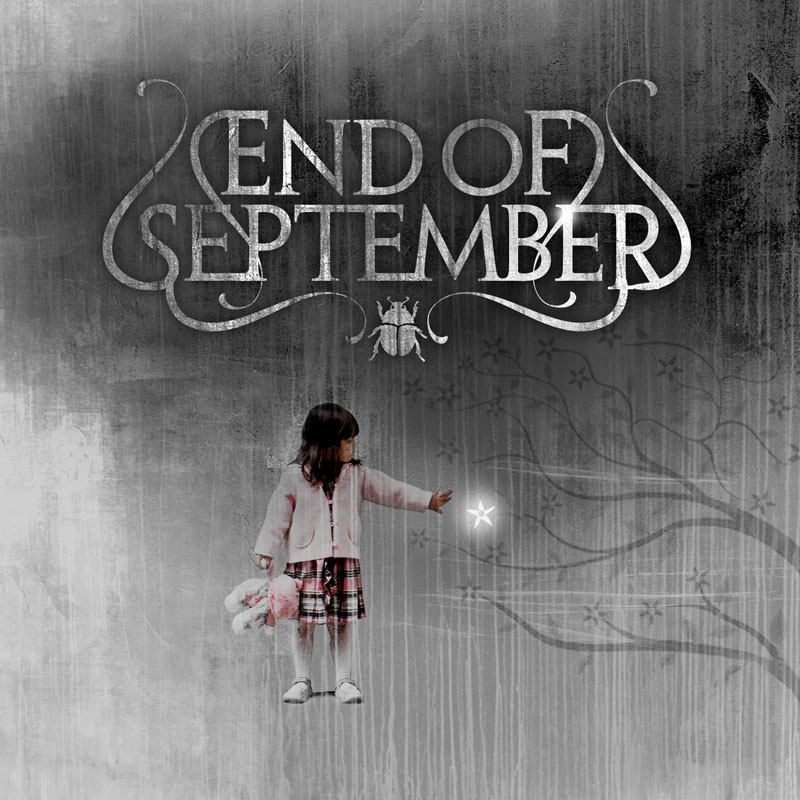End of September - Self Titled

CD Info
2012
Ulterium Records
9 Tracks
English Lyrics
End of September’s first self-titled album joins a densely populated genre, where many bands have a sound that is indistinguishable from Nightwish, Epica, or Within Temptation. As a result, End of September’s greatest challenges lies in establishing their own distinct sound, which is discernible and amply supports their artistic vision. Moreover, they must also be able to maintain a sound that is consistently captivating and is never lured into becoming repetitive.
On a whole, the album itself demonstrates a strong effort to disentangle itself from the easily reproducible musical patterns that so many melodic metal bands before them have used. One of the elements that helps make this band stand out is the lead vocalist, Elin Redin’s strong voice. Throughout the album, her voice never sounds hoarse, as if her vocals were being pushed beyond their capacity. Instead, Elin Redin has a powerful voice that can effortlessly belt notes that many vocalists often struggle to sustain without the notes turning flat. In worst-case scenarios, belting notes even translates to unmelodic screeching that obstructs the flow of the music. Effectively, Elin Redin’s voice supports the heavy rock sound and augments the bombast of emotions that are strongly evoked by the desperate notes of each song.
Within this album, each of the songs are curiously titled "A Place to Go," "Exile, "Fallen," "Silence," and "Autumn Breaks." While the album is self-titled, the band’s name, End of September, thematically relates with the overarching theme of the album. Throughout the album, there is an unassailable feeling of detachedness between the vocalist and the lost vitality of her life. As a result, the heavy, fragmented rock beat of each song only serves to validate this sudden loss of great importance in her life. With such a universal theme, the album’s theme is relatable to nearly everyone, and it is ambiguous enough to be subjected to an array of different interpretations. Nearly everyone has experienced that ineffable sense of disorientation in our lives, when a loved one who provided us with solace and meaning in our lives, suddenly leaves us at the end of the symbolic summer of their life. Left with our own inconsolable grief, the hope for the restorative abilities of spring presents itself as an unreal force against the disparaging grief of autumn and the eventual deadening apathy of winter. Essentially, this album provides voice to that grief and acts as a healthy cathartic release of the tumult of uneasy emotions that are typically produced by loss.
By having such a singular thematic focus, each of the songs has a seamless flow as the weight of the singer’s inexpressible grief becomes musically expressed. In "Inner Voice," the vocalist even debates whether or not her grief that saturates her mind has deprived her of her sense of identity. Remarkably, the song reveals the difficulty of articulating loss through an artistic medium like music that allows for paradox and confusion. Interestingly, the song "Exile," with fierce guitar chords that are reminiscent of those found in a Breaking Benjamin song is one of my favorites on the albums because it reflects the resilience that underpins each of these songs that could have easily succumbed to a fit of self-loathing. This album is not one about forsaking one’s life in the midst of sorrow, but working through the grief and leaning to triumphantly live beyond it. It is album that offers a cathartic release, rather than something that deflates our optimism further.
Overall, it is an album of strength, and not one that withers away in silent despair. At times, I completely forgot that the album was the band’s first because it has a very mature sound and a clear direction. Of course, there were a few problems. Oftentimes, some tracks sounded similar to others due to similar guitar chords that were reused in several tracks. In effect, some tracks were not nearly unique enough. Additionally, I felt that the male vocalist, who occasionally served as a growler during some of the tracks, did not really compliment the vocalist in anyway. The only time the second vocalist can assist the vocalist well is if this additional vocalist’s voice fuses with the music well. Instead, the male vocalist at some points was utilized only to meet some genre expectation. Elin Redin’s voice alone really does not need assistance due to the sheer power of her voice. It reminds me of one of the biggest problems with early Within Temptation’s music, where Robert’s horrible growling was an unwanted distraction from the beauty of Sharon’s voice. Adding second vocalists is a tricky business, and I feel End of September does not need an additional vocalist, unless that vocalist had the skill to compliment the strength of Elin Redin’s voice.
Aside from these problems, these songs still boasted great musical finesse that is not evident in many sophomore albums. Moreover, there was great energy in the sound, making this album very listenable. While the album was not an unprecedented masterpiece by any means, it is a very good beginning album with many catchy, dynamic songs. Hopefully, the band End of September will outlast the brutal winter of their genesis and will continue to evolve as a band in subsequent albums. I’m foreseeing very good things for this band.
Score: 8 / 10
Favorite Tracks: Inner Voice, Exile, Fallen
